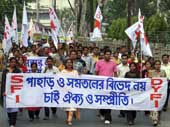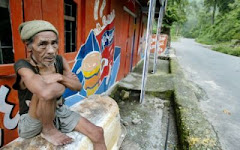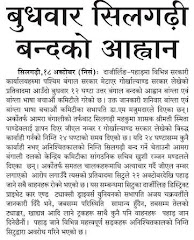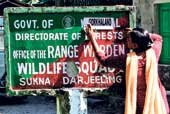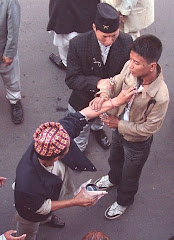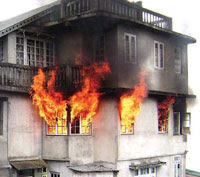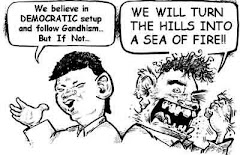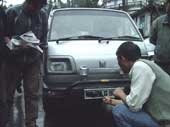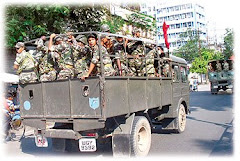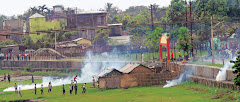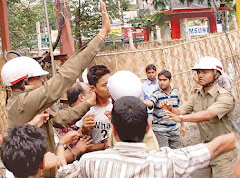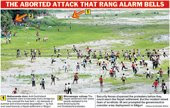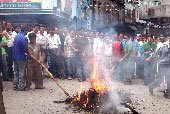Back Drop
It will be justified if we begin our discussions from 1950, because from 26.1.1950 the constitution of India was commenced, Indo Nepal Friendship Treaty was also signed and ratified on 31st July 1950. It is also necessary to mention that in the year 1988 on 23rd august through an extraordinary gazette notification the government of India clarified that amongst the class of people known as Gorkhas, only those who were either born or had been resident in the territory of India from before 26.1.1950. are citizens of India.
Facts and figures
Number of Nepali speakers in Darjeeling district on 1951 was 88,958. This is the basic figure or the actual number of Nepali speakers in Darjeeling district at the commencement of the constitution of India. Just after a decade, 1961 census the number of Nepali speakers in Darjeeling rises to 369,130.which means an addition of 280,172 persons. The average percentage of growth rate in West Bengal in that same census was + 32' 80% when calculated according to this growth rate the justified increase of the Nepali speakers would be by 29,178. which would make a total of 88958+29178=118,136 which should have been the actual number of Nepali speakers for the decade ending in the year 1961 for Darjeeling district. Evidently the extraordinary increase in the number of Nepali speakers in Darjeeling district that is 369,130-118,136=250,994 was exogenous, which means they were foreigners from Nepal migrated to India by courtesy of Indo Nepal Treaty. It is a matter of great regret that the same trend is continued till to day unmonitored and uncared. These days the number of migrants from Nepal increased in an unimaginable rate, for example the growth rate of Nepali speakers in India in a decade 1981 to 1991 was + 52'62% from 1991 to 2001 it was + 38'29% .This huge number of foreigners created by Indo Nepal Treaty had come to India as non citizen legal migrants, but in flagrant violation of all the legal provision and constitutional obligations, the Nepali nationals are taking part in political agitations and other activities including elections in India. Shockingly our governments have preferred to remain silent spectators to this circus of extreme disrespect to the constitutional restrictions of our country. These migrants from Nepal continues to pour in through the open boarder unchecked, uncounted through ages no one cares to know who they are where from are thy coming, why are they coming, where do they go in India ,what do they do here in India, alas! It seems this is no body's concern here, the governments seem to have forgotten their constitutional compulsions to preserve the sanctity of the same.
All India Gorkha League an opportunistic political out fit organized their central office at Darjeeling in the year 1952 with the intention to use the migrants from Nepal to achieve narrow political gains. The protagonists of All India Gorkha League started politicizing the whole issue and under cover of those so called political moves they tried to camouflage the continued migration from Nepal to India, as a part of this evil design the Gorkha leaguers initiated ingenious inclusion of the whole of Nepali migrants into the domestic polity of India at Bengal province, Nepali identity was skillfully concealed behind British legacy to artificially promulgate a continuity from pre independence time in India which was in no way even near the truth, the nomenclature ' Gorkha' (which was never an ethnic identity) or the emblem of crossed 'Khukris'were selected as symbols of identity for the whole community, only for its pertinence to the Gorkha regiment of British Indian Army. The inane and dangerous politics of A.I.G.L. at Darjeeling, wherein they aligned the aliens from Nepal (Beneficiaries of Indo Nepal Treaty) with the citizens of India, unfortunately both belonging to the same linguistic community of Nepali speakers, which was an advantage for the aspirants of A.I.G.L. The hostile polarization of a bellicose community was the target of the Gorkha leaguers and this sort of political maneuvers are apt to produce certain concomitant eventualities like general deterioration of law and order situation and Darjeeling was no exception. Being connected to India and Indianism through only an imaginary umbilical cord of British Gorkha regiment, which was actually a hypothesis of convenience for the foreigner Nepali nationals in India, it was an easy mission for their mentors in A.I.G.L.to inculcate unreasonable communal hatred against the Bengalese in the hills of Darjeeling. In the year 1961 the so called rally in Darjeeling town in support of the demand for official recognition of Nepali language marks the beginning of marginalization for Bengalese in the hills of Darjeeling, through intimidation, assaults and coercion. Never less than eighty to ninety percent of the teachers, government servants, hoteliers and other businessmen of the hills were Bengalese, who began to recede on the face of organized violence of the land grabber foreign aggressors in our Indian soil. Even though there was full scale anti Bengali rioting by the aggressors of Gorkha league in the year 1970, non interference and inactivity of the government was conspicuous and in absence of constitutional governance the supreme leader of the rioters Mr Deoprakash Rai projected himself to be one and only one extra constitutional authority in his domain of the hills, it was he who initiated the riot ideologically and when the victims were scared enough to get the message he wanted to convey he reversed his role into that of a messiah for the victim Bengalese. This shame full surrender of the constitutional authority of India on the face of atrocities from the so called Gorkha aggressors, the majority of whom were confirmed foreigners from Nepal, was on principle the end of the rule of law in Darjeeling. On the face of continued intimidation and coercion and even attacks on private residences of Bengalese who were majorities in all three hill towns namely Darjeeling , Kurseong and Kalimpong, residing at those places from last 100 to 150 years, Chandmari, Guddi road, Ferendal road, Bilombari road, Dhobitola, Victoria falls and the vicinity of municipal building, every place had been densely inhabited by the Bengalese. Other than the government servants what we have already mentioned, the chairman of the municipalities and 70 to 80 percent of the municipal commissioners were Bengalese. The estates that belonged to Bengalese were forcibly occupied by the foreigner Nepalese by their fascistic gangster rule that they were allowed to continue unhindered and unabated all through Darjeeling hills till today .leaving aside the smaller private residences of Bengalese, let us take an account of the important heritage premises; the research laboratory of Sri Jagadish Chandra Bose with its surrounding compound, the huge compound of Basanti annex which belonged to Deshbandhu Chitta.Ranjan.Das, the land and the villas with the Capital Hall which belonged to Maharaja of Coochbehar , Lalkuthi the present day office of the D.G.H.C.and the surrounding land, all belonged to the same Maharaja and at present under forcible occupation of the intruders, the Burdwan House with its estate, a huge plot of land under the bridge of Victoria falls which had been Mr Biren Ghose's nursery, the house of the Kusharies on all the land space above Victoria falls, Maharani Girls' School, Ramkrishna Siksha Parisad, RamkrishnaVedanta Ashram temple with the huge school attached to it founded by Swami Abhedananda, all these were Bengali schools and Bengali organizations. Whether it was Luis Jubilee Sanatorium, or the rail way stations every where the workers and officers were mostly Bengalese so also were the tea gardens where most of the managerial staff, clerical and technical staff were Bengalese. The largest dairy farm of this region was a Bengali farm (Ganguli's) at Sonada near Darjeeling town. This never ending list establishes the fact that the hill towns with surroundings were naturally inhabited and dominated by Bengalese, the inhabitants of Bengal. Mass scale intrusion of the Nepali nationals as labourers and other fortune hunters in the tea gardens and surrounding rural areas brought in a massive change in linguistic demographic pattern of the region. This has to be mentioned with great regret that all the institutions of government of India had been a non interfering spectator of this upset in demography even when the foreign nationals out numbered the genuine nationals of the country. Empowered by the indulgence of inaction from the government agencies these aggressive band of gangsters ousted the Indian citizens from this part of Indian soil through continued intimidation and coercions, being helpless due to failure of the government to come in rescue Bengalese had to leave their favorite hill towns where most of them were born, and those were the places which grew up in their own hands and at the expense of their tax money. After relinquishment of Bengalese the hills of Darjeeling entered the era of domination by the gang stars of mostly or almost totally foreign nationals, census figures of 1971- 446,446, 1981- 1991 to 2001, are clear and true evidences of overwhelming growth of foreign Nepali nationals in Darjeeling district. As because the command and control of the administration in the hills of North Bengal virtually had gone into the hands of gang stars of the Nepali community due to continued appeasement from the administrative authorities on one side and unabated in pouring of endless flow of the Nepali migrants as intruders in our polity on the other side, in the year 1983 December, Mr Subhas Ghising emerged as a leader of the so called Gorkha National Liberation Front in Darjeeling and submitted a memorandum to the king of Nepal asking him to take measures to settle certain imaginary geopolitical disputes in India concerning the migrated people from Nepal to India, this gentleman who is practically a leader of the foreigners from Nepal in India, had no hesitation to send copies of this memorandum to U.N.O. and to the heads of many other foreign countries. Even after this disregard shown to the sovereignty and the constitutional authorities of India, our government preferred to act as if it is unaware and remained un-interfering. This same out fit G.N.L.F. continued with violent fascistic atrocities in the name of Gorkhaland movement from 13th April 1986 to 23rd August 1988.During this time period governance from the side of administration was totally absent in Darjeeling. Brutalities and killings were daily affair in Darjeeling, as the Bengalese were already ousted and out numbered in the hills, hence this time the target was political cleansing no one except the followers of the communal outfit of so called Gorkha interest were allowed to survive or operate in the hills, this is conspicuous from the virtual absence of any political activity from any one of the all India political parties in Darjeeling. C.P.I.M. a political party which had some political foot hold in the hills achieved through appeasement of course, received most of the beating. Chopped off head of C.P.I.M. leader was even hanged in a public place in Darjeeling town in one or two episodes, but not even a single eyebrow was raised and this sort imported cruelties continued on our sacred soil. Kidnapping, rioting, arson, attack on police force continued un interfered from 1986 to1988, government properties worth not less two hundred crores were destroyed shockingly for the Indians of this area, almost all the heritage buildings of the hills were burnt to ashes, which was but natural for the foreign national fortune hunters in our soil who does not have any emotional connection with our land and heritage. We have already shown how the basic figure of Nepali speaker Indian nationals hiked to an increase of more than three times in one decade and that the trend continued in Darjeeling district at the same rate or even more through decades after decades, this 'Psunami' of foreigners in Indian soil after ensuring sustenance here in India want achieve political space by any means. If this not war situation for a country what else is it then?
The situation was of trickily executed foreign invasion of the hereditary land grabbers from Nepal, our political leaders failed to appreciate the gravity of the situation, and were busy with petty terminology for classification of the movement as to whether this is separatist or anti-national, only to achieve short term smaller political gains at the cost of the sanctity of our mother land, the leaders of the national political parties did not have the commitment within them to take the bull by its horns. It was a grim situation and a national crisis yet there were none from the side of the administration to say enough is enough or to ask for identifying the foreigner Nepali migrants in Darjeeling so that they can be debarred from taking part in political movements unlawfully and continue with such horrifying and savage activities, the local inhabitants of the plain lands of Darjeeling district as usual remained unheard, even though few study forums of the plains of north Bengal namely Bangiyo Jubo Kalyan parishad, Siliguri and Bangiyo Adhikar Mancha, Bagdogra kept on sending memorandums and letters tirelessly to all the concerned institutions of central and state government, may be because these Indian organizations took to pen and not gun and preferred not to go for social disobedience in their own country, our government did not think it necessary to hear them. Hence rampant anarchy and lawlessness in the name of so called movement went on and despite all the atrocities administration sponsored appeasement continued too, as an inevitable outcome of this appeasement Subhas Ghising the leader of G.N.L.F. secured the post of the chairman of one newly formed autonomous body named D.G.H.C. very soon the chair man of D.G.H.C. Mr Ghising placed himself above all the laws and norms of India and refused to show accounts of the expenditure of government money or to submit utilization certificate for the same, but even that too was borne with patient shrugs of shoulder. It is not a concealed fact that the chief minister of the state or even the prime minister of the country had to wait for green signal from those aggressors to hold a meeting at Darjeeling, as usual the government had nothing to do about that too and over looked it. Mr Ghising was well aware about the presence of the huge number of foreign nationals residing in India in general and Darjeeling district in particular, practically those foreign nationals were the main strength of his movement, this fact is clearly understood when we take notice of the fact that as an aftermath of the deportation of Nepali labourers picked up from the coal mines of Assam it was actually the fear psychosis of Nepali nationals residing in India which triggered overwhelming support and attendance in the black flag day meeting at Chawkbazar Darjeeling on 13th April 1986 convened by Mr Ghising, in fact this huge gathering was beyond even the wildest dream of Ghising, because this was the first time that Mr Ghising could collect listeners for his oratory, from this time onwards Mr Ghising following the path of A.I.G.L.in 1952 and Mr Bhandari the ex chief minister of Sikkim took up the strategy of preserving this support base of foreign nationals in India for him and his G.N.L.F. through an illusory deceit of obtaining Indian citizenship for the migrated Nepali nationals in India. These foreigners from Nepal were at one hand frightened about their stay in India which was essential for their sustenance and on the other hand they were anxious to get the guarantee of Indian citizenship too. They new that they were foreigners, hence they were aggressive with there teeth and nail, this psychology of the migrants of Indo Nepal Treaty is evident in their abnormally aggressive attitude at political rallies or public meetings where they appear with Khukris hanging from their belts. The government authorities knowing fully well that those aggressors from the days of language rally of 1961 to the black flag day meeting of 1986 were mostly foreigners, did not care to even blink an eye lid on this issue for reasons best known to them. Mr Ghising over zealous after subversion of the government authorities in Darjeeling on the face of threat from him and his outfit G.N.L.F fortified his seize on the hills of north Bengal by deliberately defying the state government in all spheres. Meanwhile right from the beginning of his active movement that is the ghastly days of 1986 Ghising was continuously harping on two points, one was the clamour for incorporation of territory of Darjeeling and Doars of north Bengal into India, he opined that those were ceded land of Nepal, unclaimed hence rendered no mans land and lease hold land of Bhutan respectively, the other point was claim for grant of Indian citizenship for so called Gorkhas of India, the number of whom he opined were 60 lacs but according to census of India Nepali speakers in the year1981 was 1,360,636 and even in 1991 it was 2,076,645.in India. This is one evidence which unveils the unholy design and the intention of the G.N.L.F. leader, he was knowingly trying to mislead govt of India to unlawfully achieve grant of Indian citizenship for foreigners from Nepal under 'incorporation of territory'(Act 7 of the Citizenship act, Acquisition of) and continue this process indefinitely which could be absorbed into the cushion of fictitious sixty lacs of Nepali speakers in India. Unfortunately for Mr Ghising he could not procure his desired order for incorporation of territory from government of India, after being unsuccessful in this futile attempt to deceitfully manage citizenship for Nepali nationals in India this time his claim was for autonomous hill council in Darjeeling under provisions of 6th schedule of the constitution of India, visibly it was a frantic attempt from him to create an area within India which would remain an enter pot for the Nepali nationals from across the boarder under Indo Nepal Treaty and fraudulently convert them into Indian citizens. But this proposal of Mr Ghising did not get its passage through parliament and was referred to parliamentary standing committee, smelling chances of indefinite delay Ghising wanted to become the perpetual ruler of the hills. All legal and constitutional obligations of our country were flouted, all decorum of democracy disregarded as Ghising refused to go to election till the bill for promulgation of 6th schedule in Darjeeling hills is through. The subverted government failed to protect the sovereignty of the constitution of India, shamefully the constitutional authority of the state succumbed to the atrocities and threat from a handful of foreigner gang stars. With great regret and pain the Indian citizens of the plains of north Bengal observed that when all the forums of administration turned their deaf ear to the bona fide citizens the agents of contrary to the expectation the foreigners were appeased, elections postponed on their demand, nothing was virtually possible in the hill area without their consent. But inevitable outcome of this nonchalant attitude from the government, the protector of the sovereignty of the country gave birth to another monster Mr. Bimal Gurung, an ex gang star lieutenant of Mr. Ghising. On the plea of preaching for Proshant Tamang a contestant in a T.V.channel singing competition, Mr.Gurung shot to the lime light and took command of the foot soldiers of Mr.Ghising, extortion in the name of S.M.S. for Tamang continued unabated all the tourist, all the vehicles going to the hills, the business man government servants and whoever had gone to Darjeeling on those days had become victims of extortion or abasement, as usual government machinery for maintaining law and order was conspicuous in its absence. Being the natural out come of this free for all license from the keepers of law the foot soldiers of Gurung in the name of victory celebration transferred their go as you like activities on the plain lands of Bengal Terai too, victory processions were organized at very many places of plains at the foot hills, the communal over tone in place of joy of celebration was prominently perceptible in the behavior of the participants of victory rally in Siliguri atrocities crossed the threshold of tolerance level of the locals when an ambulance was obstructed at the gate of the hospital and a pregnant lady was manhandled. At least on the plains we were happy to see the administration taking prompt action, even to the extent of deployment of army to the rescue of the participants of victory procession from the fuming anger of the locals. No one knows when shall we see such an active government machinery for protecting sanctity of the constitutional provisions in the hills where contempt of the same in the hands of foreign intruders in our socio political sphere is a rule since 1961. Just after this episode Gurung of his own picked up the torch of so called Gorkha land movement and virtually started a parallel government of his fascistic gang star rule, the ministers, M.L.A. and even the district magistrate who is the highest administrative authority of the district were debarred from entry into the hills, along with this anarchy there were galloping is crease of extortion from the people of plains who could not but go to the hills on business as the district headquarter for Siliguri subdivision is Darjeeling, even after this chaos and anarchy reached its peak and the agony of the victims to extreme, the role of our government was but same, it was only divine inaction and silence, making rule of law insignificant and oppression unrestrained. Jubilant at their success in subverting the government authorities G.J.M.M. of Gurung tried to create a riot like situation in the plains of Terai and Doars by continuous provocation through demonstrations hunger strike and even attacks at selected places. G.J.M. protesters were on hunger strike at Panighata More Bagdogra and inside the campus of the Block Development office, Government of West Bengal, Naxalbari, those hunger strike centers became informal camp office for G.J.M. and were buzzing with perpetual gathering of G.J.M. activist through day and night, as centers of fright and danger for the simple and peace loving people of the area irrespective of their community, in contrary to the expectations of G.J.M. people in the plains did not react violently against those centers of provocation, in the meantime a citizen's organization was to initiate its signature campaign for their memorandum to the Prime Minister of India from 8th June 2008, requesting him to identify the foreign nationals from Nepal in India, visibly nervous G.J.M. brought trucks full of activists mostly from Nepal and its vicinity to Bihar More Bagdogra where they sat for a road blockade, even though there were enough police force present with two administrative heads of the sub division the blockade on NH31and NH31C was allowed to continue uninterrupted for three and half hours in spite of several requests from the victims of the blockade, when it appeared that the anger of the victims may become unmanageable the police took to Lathi charge on the inhabitants of the area and the activists while going back caused havoc in the locality there were incidents of stone pelting, trespass, assaults, intimidation, and even one incident of arson, but the administrative authority did not think it was necessary to take up the cognizable offences and start proceedings so that law can take its own course, and the criminals can be booked, not even sec 144 was promulgated as a preventive measure, but only next day the signature campaign of the citizen's organization JANA CHETANA was obstructed through promulgation of sec 144 at Bagdogra, interestingly both at Bagdora and Naxalbari the activists of G.J.M. who were on hunger strike were exempted from sec 144, hence they were continuing with their hunger strike under police protection. When the evil design of shifting the theater of skirmishes and heated political atmosphere on to the plains of North Bengal did not materialize, out raged Gurung called for an indefinite period strike and told the tourists to get out of the hills immediately, panic stricken tourists were harassed humiliated and forced to pay huge some of money to get a transport to go out of the hills, but even that was not the end of it, in this law less, governance less in fact government less territory of terror they were attacked at places with chopper and vehicle carrying tourists were burnt at Malbazar, amidst all these chaos and intimidation the exhausted tourists had to reach Siliguri in vehicles packed like canned sardines, just to be stranded at Siliguri which virtually collapsed under pressure of this huge number of tourists, we do not any more feel ashamed to say that police was inactive and spectators only, gravity of the situation can be assessed from the fact that government administration had to arrange one special train and 15 buses extra for the tourists so that they can at least reach Kolkata safely. All those shameful inertness of a practically subdued government and inactive police force naturally encouraged G.J.M.. to start defying the government in official and administrative spheres, as a challenge to the authority of government G.J.M. activists started changing the number plates of the motor vehicles where in place of W.B. they are compelling people to write G.L and at the same time collecting Gorkhaland tax from the vehicle owners, the most serious or the funniest part this whole commotion is that the government vehicles too are not exempted from this change over, none of the government offices had shown the courage to refuse this forced change over or to remove the tampered number plate, the activists of G.J.M. in their attempts to subvert the government authority are not hesitating to tamper with the registration certificates of the vehicles even. The government revenues like electric bills, motor vehicle taxes and telephone bills are not paid by any one in accordance to the directions of Bimal Gurung and his comrades, the offices of the respective departments are threatened of dire consequences if they try to discontinue the services for non payment of the bills. Every day a new injunction is imposed which even reaches to the extent of declaring dress code for people of Darjeeling. We have recently observed how the tyrannical leadership of the G.J.M threw Subhas Ghising, Dawa Pakhrin and other opposition leaders out of the hills to forced exile, and how their cars, houses and other properties were burnt to ashes. Last desire of Mrs. Ghising was left unfulfilled, because her dead body was debarred by the fascist gang star rulers from entering Darjeeling for cremation according to her last wish. Without going into every detail of failure from the side of the government, in simple words the whole of this hilly territory of Darjeeling, Kurseong, and Kalimpong is governed controlled and ruled by political out fits who initiated their unholy operations of smash and grab from the later years of 1950 making use of the fear psychosis of the migrated Nepali nationals in India, under Indo Nepal Friendship Treaty, even though they are legal migrants but unfortunately they have become illegal intruders into our socio political sphere. One has to understand the situation in Darjeeling is in no way similar to our domestic controversies of state reorganization.
A quick review of the census figures from 1951 to 2001will reveal the inner story of Gorkhaland movement which will be a glaring example of how India is invaded by foreigners, who are of late trying to disturb the peace, unity and sovereignty of our country.







